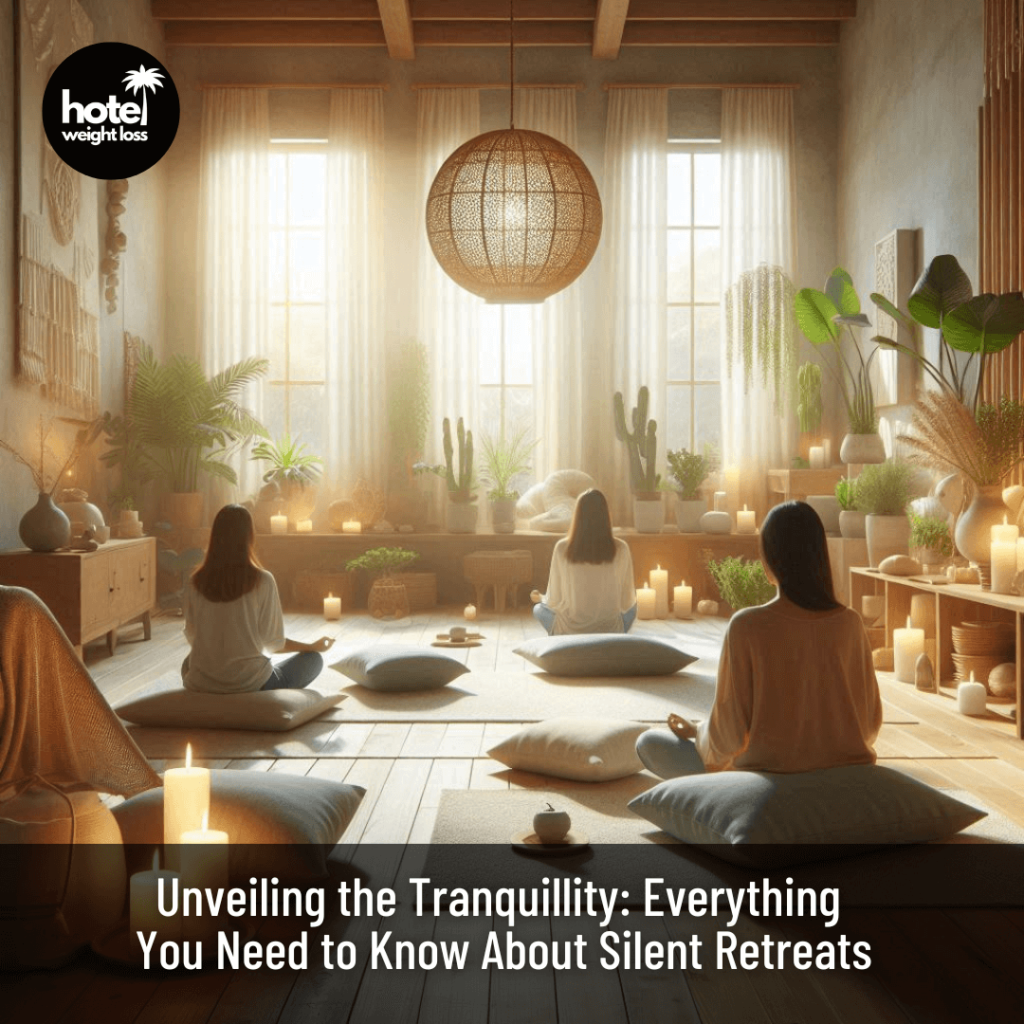Critical Takeaways:
- Silent retreats involve periods of silence for self-reflection and inner exploration.
- Benefits include stress reduction, improved focus, and deeper self-awareness.
- Different retreat styles cater to various preferences (meditation, yoga, mindfulness).
- Proper preparation ensures a smooth and enriching silent retreat experience.
A silent retreat might seem radical in our fast-paced world, bombarded by constant noise and information overload. But for many, these retreats offer a powerful opportunity to reconnect with themselves and experience a profound sense of inner peace.
What is a Silent Retreat?
A silent retreat is a structured program where participants vow to silence for a designated period, typically from a weekend to a week or even longer. During this time, verbal communication is minimised or eliminated, allowing individuals to focus on introspection, meditation, and a deeper connection with their inner world.
Why Choose a Silent Retreat?
The benefits of silent retreats are numerous and well-documented. Studies from Harvard University have shown that meditation practices, often central to quiet retreats, can significantly reduce stress and anxiety. Additionally, research published in the Journal of Cognitive Enhancement suggests that mindfulness exercises, another common focus of silent retreats, can enhance cognitive function and improve focus.
Beyond these quantifiable benefits, silent retreats offer a unique space for self-discovery. By removing external distractions, participants can clearly observe their thoughts and emotions. This introspection can lead to a deeper understanding of oneself, one’s values, and one’s place in the world.
Types of Silent Retreats:
While the core principle remains constant, silent retreats come in various styles to cater to individual preferences. Here are some famous examples:
- Meditation Retreats: These retreats focus on meditation practices like mindfulness meditation and Vipassana meditation. They typically include guided meditations and periods of silent meditation throughout the day.
- Yoga Retreats: Many silent retreats incorporate yoga as a core practice. These retreats offer a holistic approach to well-being, combining the physical benefits of yoga with the reflective power of silence.
- Writing Retreats: For those seeking a creative outlet, silent writing retreats provide a peaceful environment to focus on their craft without distractions. These retreats often include dedicated writing time alongside periods of quiet reflection.
Preparing for a Silent Retreat:
Leaping a silent retreat can be both exciting and daunting. Here are some tips to ensure a smooth and enriching experience:
- Choose the Right Retreat: Consider your interests and expectations when selecting a retreat. Explore different retreat centres, styles, and durations to find one that resonates with you.
- Set Clear Intentions: What do you hope to gain from your silent retreat? Having a clear intention can help you stay focused and motivated throughout your experience.
- Practise at Home: Before starting your retreat, incorporate short silence into your daily routine. This can help you adjust to the lack of verbal communication during the retreat.
- Pack Light: Focus on comfortable clothing and essentials. Remember, most retreats provide necessities like linens and toiletries.
Embracing the Silence: A Day in a Silent Retreat
A Typical Day at a Silent Retreat
A typical day at a silent retreat might look something like this:
- Morning: The day often begins with a wake-up call and a silent meditation. This is a time to focus on your breath and quiet the mind. Many retreats also offer yoga or gentle movement practices to awaken the body and prepare for the day.
- Breakfast: Meals are typically enjoyed in silence. This allows participants to savour the food and be present in the moment.
- Activities: The schedule may include guided meditations, workshops on mindfulness or other contemplative practices, and periods for self-reflection. Some retreats also offer optional activities like walking, meditation, or journaling.
- Lunch and Afternoon: The day continues with a silent lunch followed by further activities, meditation sessions, or free time for rest and contemplation.
- Dinner and Evening: Dinner is enjoyed in silence, followed by an optional evening program, such as a guided meditation or a Dharma talk (a talk on Buddhist teachings). The day concludes with a final meditation session before lights out.
A Personal Anecdote: My Silent Retreat Experience
While I can’t share details due to the vow of silence, my silent retreat experience was transformative. A profound sense of peace and clarity quickly replaced the initial discomfort of not speaking. The silence allowed me to observe my thoughts and emotions with a newfound detachment. I noticed patterns of worry and self-criticism that I hadn’t been aware of before. This powerful self-awareness tool allowed me to challenge these negative thoughts and cultivate a more positive self-image.
Benefits Beyond the Retreat
The impact of a silent retreat extends far beyond the duration of the program itself. The skills and insights gained during the retreat can be integrated into daily life to create lasting positive change. Here are some ways silent retreats can benefit you in the long run:
- Reduced Stress and Anxiety: The practice of meditation learned during a silent retreat can be used to manage stress and anxiety in everyday situations. By focusing on the present moment and calming the mind, you can better navigate the challenges of daily life.
- Improved Focus and Concentration: The quiet introspection of a silent retreat can sharpen your focus and concentration. Learning to quiet the internal chatter can make you more present and productive in your daily tasks.
- Enhanced Self-Awareness: The self-discovery during a silent retreat can lead to a deeper understanding of your values, motivations, and desires. This increased self-awareness can empower you to make more conscious choices.
- Greater Compassion: The practice of mindfulness, often emphasised in silent retreats, can cultivate a sense of compassion for yourself and others. By observing your thoughts and emotions with kindness, you can extend compassion to those around you.
Challenges and Overcoming Obstacles
While the benefits of silent retreats are undeniable, it’s essential to acknowledge that they can also be challenging. Here are some common obstacles you might encounter, along with tips for overcoming them:
- Discomfort with Silence: The initial absence of verbal communication can be uncomfortable, especially for those accustomed to constant social interaction. However, this discomfort usually subsides after a few days as you adjust to the new environment.
- Restlessness: Without external stimulation, your mind may become restless or wander during meditation sessions. This is perfectly normal. Acknowledge these distractions and gently bring your attention back to your breath.
- Emotional Arise: As you delve deeper into your inner world, you may encounter uncomfortable emotions like sadness or anger. These emotions are simply part of the self-discovery process. Allow yourself to feel these emotions without judgment, and they will eventually pass.
- Missing Loved Ones: If you’re away from family or loved ones for the first time, you might experience feelings of loneliness. Remember, the retreat is an opportunity for self-care, allowing you to return to your loved ones feeling refreshed and revitalised.
By acknowledging these challenges and applying these tips, you can navigate the potential hurdles of a silent retreat and reap its many benefits.
Is a Silent Retreat Right for You?
Silent retreats are only for some. Here are some things to consider before embarking on this unique experience:
- Introspection vs. Social Interaction: A silent retreat might not be the best fit if you thrive on social interaction and find solitude challenging. Consider alternative wellness retreats that balance introspective activities and social connection.
- Medical Conditions: If you have any pre-existing medical conditions, consult your doctor before attending a silent retreat. Some retreats may have restrictions for individuals with certain medical conditions.
- Financial Investment: Silent retreats can vary in cost depending on the location, duration, and amenities. Carefully research different retreat options to find one that fits your budget.
Ultimately, the decision of whether or not to participate in a silent retreat is a personal one. However, for those seeking a transformative journey of self-discovery and inner peace, a quiet retreat offers a powerful and rewarding experience
Deepening Your Practice: Silent Retreats and Weight Loss
The Intersection of Silence and Weight Loss
While silent retreats might not be the first thing that comes to mind when considering weight loss strategies, there’s a surprising connection between inner peace and achieving a healthy weight. Here’s how a silent retreat can complement your weight loss journey:
- Mindful Eating: Many silent retreats incorporate mindfulness practices into mealtimes. By focusing on the sensations of taste, texture, and smell, you can cultivate a more mindful approach to eating. This awareness can help you savour your food, eat more slowly, and avoid mindless overeating.
- Stress Reduction: Chronic stress is a significant contributor to weight gain, as it can lead to increased cortisol levels and cravings for unhealthy foods. The stress-reduction techniques learned during a silent retreat, such as meditation and deep breathing, can help you healthily manage stress, ultimately supporting your weight loss goals.
- Improved Sleep: A silent retreat’s quiet and structured environment can promote better sleep quality. Adequate sleep is crucial for regulating hormones that influence appetite and metabolism. By getting enough restful sleep, you’ll be better equipped to make healthy food choices and maintain energy levels throughout the day.
- Body Awareness: Silent retreats encourage introspection and a deeper connection with your body. This heightened awareness can help you identify emotional triggers for unhealthy eating habits and develop healthier coping mechanisms.
A Silent Retreat as a Catalyst for Change
Think of a silent retreat as a kickstart for your weight loss journey. Here’s how it can act as a catalyst for lasting change:
- Setting Intentions: The quiet introspection of a retreat allows you to set clear and focused intentions for your weight loss goals. By reflecting on your motivations and challenges, you can develop a personalised plan for success.
- Breaking Unhealthy Habits: The mindful practices and self-awareness gained during a retreat can empower you to identify and break unhealthy eating habits that may sabotage your weight loss efforts.
- Building Self-Compassion: Silent retreats foster self-compassion, a key element in sustainable weight loss. By learning to accept yourself with kindness, you can navigate setbacks and stay motivated on your weight loss journey.

Complementary Practices: Combining Retreats with Hotel Weight Loss Programs
While silent retreats offer a powerful introspective experience, they may only address some aspects of a successful weight loss plan. For a holistic approach, consider combining a quiet retreat with a structured hotel weight loss program like Hotel Weight Loss’s KetoNeuroGenic Weight Loss Program.
What is Hotel Weight Loss’s KetoNeuroGenic Program?
Hotel Weight Loss’s KetoNeuroGenic Program is a comprehensive weight loss program designed to optimise your body’s fat-burning potential. This program combines a ketogenic diet with targeted neurological training to address the root causes of weight gain.
Synergy for Success
Combining a silent retreat and Hotel Weight Loss’s KetoNeuroGenic Program creates a powerful synergy for weight loss success. Here’s how:
- Enhanced Self-Awareness: The self-awareness cultivated during a silent retreat can help you identify emotional triggers for unhealthy eating and support your adherence to the KetoNeuroGenic diet.
- Stress Management: The stress-reduction techniques learned during a retreat can help you manage the challenges of adapting to a new diet and lifestyle changes.
- Mind-Body Connection: The KetoNeuroGenic program’s focus on neurological training complements the reflective practices of a silent retreat, creating a holistic approach to weight management.
Conclusion
Silent retreats offer a unique opportunity to disconnect from the outside world and reconnect with yourself. The benefits extend beyond the retreat, fostering lasting positive changes in stress management, self-awareness, and overall well-being. A silent retreat can be a powerful catalyst for change for those seeking a healthy weight, particularly when combined with a structured program like Hotel Weight Loss’s KetoNeuroGenic Weight Loss Program.
Ready to embark on your weight loss journey and embrace the transformative power of a silent retreat? Contact Hotel Weight Loss at Hotelweightloss.com or call us to learn more about our KetoNeuroGenic Weight Loss Program and how it can help you achieve lasting weight loss success.
Also Checkout : 10 BEST Meditation Retreats in Thailand (2024) (thebrokebackpacker.com)
FAQs
1. What should I bring to a silent retreat?
Focus on comfortable clothing suitable for meditation and light exercise—pack essentials like toiletries and a water bottle. Most retreats provide linens and necessities.
2. What if I have a medical condition?
Consult your doctor before attending a silent retreat. Some retreats may have restrictions for individuals with certain medical conditions, such as severe mental health conditions or epilepsy. Be transparent with the retreat centre about any medications you take and inquire about their policies regarding medical needs.
3. How long should my first silent retreat be?
A shorter retreat (2-3 days) can be a good introduction for beginners. As you become more comfortable with silence, you can gradually progress to longer retreats.
4. Is it okay to take notes during a silent retreat?
The rules on note-taking vary depending on the retreat. Some retreats allow silent journaling, while others encourage a complete disconnect from external stimulation. Check with the retreat centre beforehand to understand their specific guidelines.
5. What if I find the silence overwhelming?
It’s normal to experience some discomfort during the initial period of silence. Focus on your breath and be patient with yourself. If the silence becomes unbearable, communicate non-verbally with a retreat leader to express your need for support.
6. Can I leave the retreat early if I need to?
Yes, you can typically leave a silent retreat early if necessary. However, informing the retreat leader of your decision beforehand is respectful.
7. What can I expect to experience during a silent retreat?
A range of emotions is expected during a silent retreat. You may experience feelings of peace, joy, and clarity. However, you might encounter challenges like boredom, restlessness, or even emotional turmoil. These experiences are all part of the self-discovery process.
8. How can I integrate the learnings from a silent retreat into my daily life?
Once you return from your retreat, carve out dedicated time for meditation or mindfulness practices in your daily routine. Focus on maintaining the self-awareness you cultivated during the retreat. Apply the stress-reduction techniques you learned to navigate challenges in your daily life. Remember, a silent retreat is a catalyst for change, and it’s up to you to sustain the positive momentum in your everyday life.
9. Are silent retreats expensive?
Silent retreats can vary in cost depending on the location, duration, and amenities. Budget-friendly options exist but be prepared to invest in the experience. Consider the retreat as an investment in your well-being.
10. Should I be religious or spiritual to attend a silent retreat?
Silent retreats are open to people of all faiths and backgrounds. The focus is on self-discovery and inner peace, not on religious dogma.
Ready to lose weight and find inner peace? Explore how a silent retreat can jumpstart your journey. Visit Hotel Weight Loss at https://hotelweightloss.com/ to learn more about our programs and unlock a healthier, happier you!




